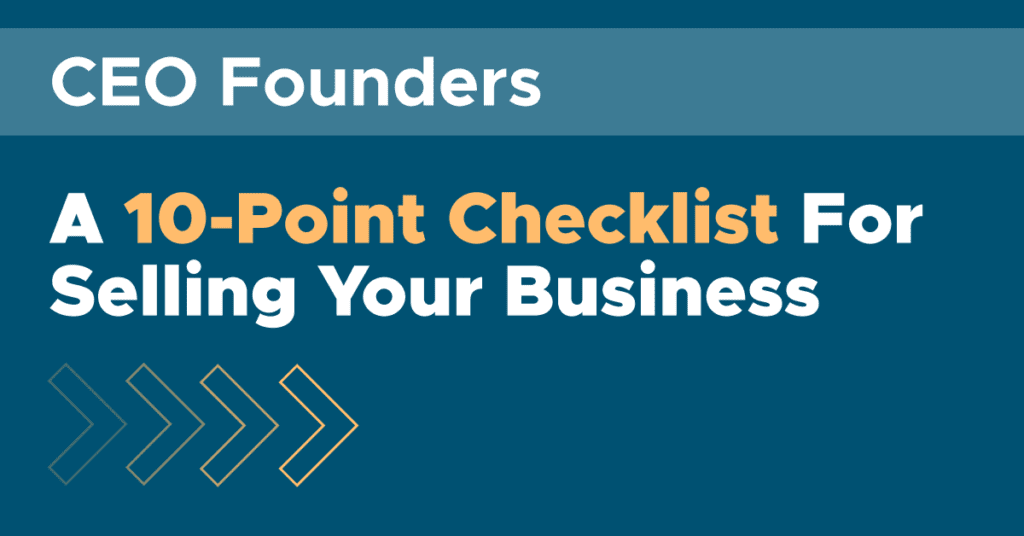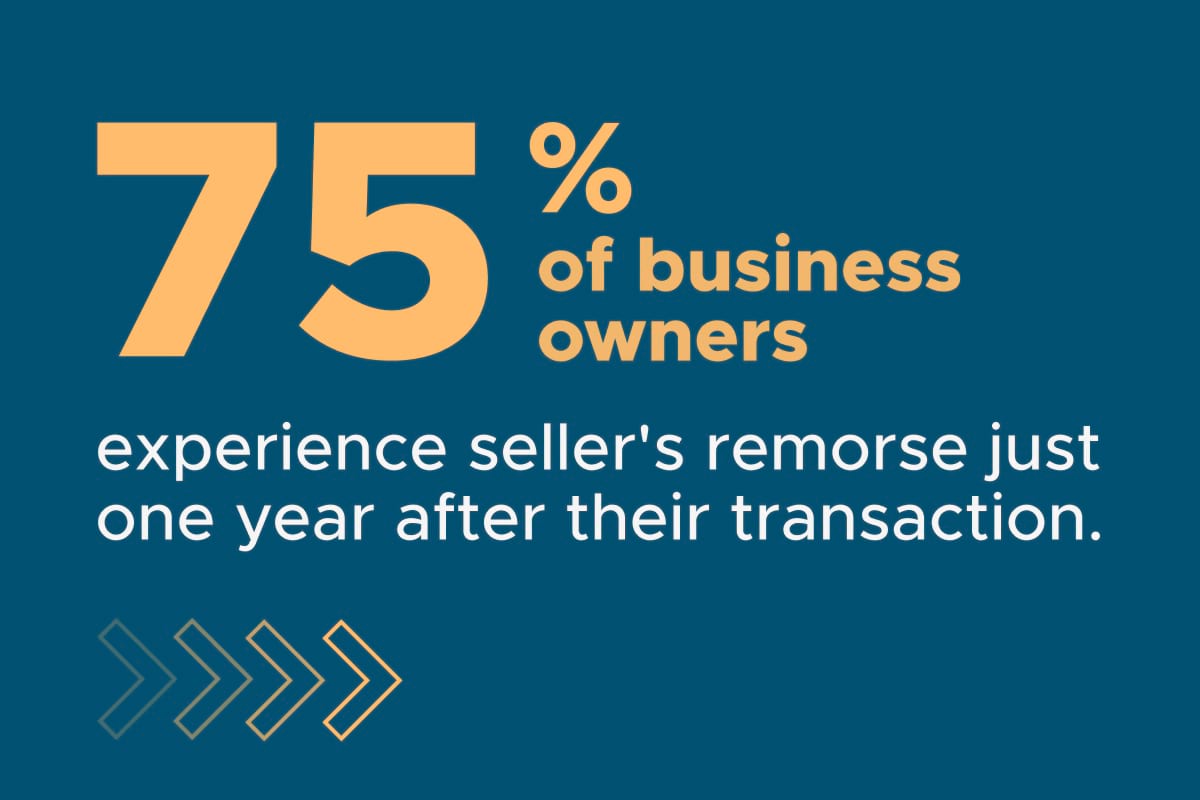When is the right time to begin planning for selling a business? It’s sooner than you think.
Too many CEO Founders begin planning too late, or not at all. Consider this: 75% of business owners experience seller’s remorse just one year after their transaction for an event that could be one of the most important of their careers.*
While obviously not an ideal situation, it’s also not surprising. Many CEO Founders are so immersed in the day-to-day operations of their businesses that they don’t take the time to consider business exit strategies.
However, that eventual exit is something that should be carefully considered, planned for, and ultimately executed on. When the sale or transition does finally happen, there is still work to be done to help ensure the legacy you envision is realized.

To help make that vision a reality, the following is a checklist of key considerations and actions that every CEO Founder should consider exploring before and after the sale or transition of a business.
Pre-transaction
1. Establish a Vision
As a business owner, ask yourself early on, “How, when, and why do I want to transition or sell my business, and to whom?” Are you seeking liquidity? Do you want to remain involved in your business after the transition, or step away completely? Are you looking for “patient capital,” such as from a family office that could invest in your business for a decade or more? Or are you open to private equity suitors that will likely sell the business in 3-5 years?
If you want to keep the business in the family, does the next generation want to be involved, and are they ready and capable to take over?
“These are questions that should ideally be asked years in advance of any transition. The sale or transition of a business can take a myriad of different forms, which is why it’s so important to carefully think through your objectives and have clarity around what you want to happen and when,” advises Avy Stein, Cresset Co-Founder and Co-Chairman.
2. Plan for the Unexpected
Even with a clearly thought out and documented transition plan, business owners need to be prepared for the unexpected. What if illness strikes and you can no longer run your business? What if you pass away unexpectedly? On a brighter note, what if an unexpected offer comes up that (you think) you can’t refuse?
“All of these scenarios highlight the need to have transition plans and processes in place now,” says Eric Becker, Cresset Co-Founder and Co-Chairman. “You don’t want to wait until opportunity – or tragedy – comes calling to make these decisions.”
3. Look at Your Industry Broadly and What the Future Will Likely Bring
While you may hope to continue operating your business for another 15 or 20 years, it is wise to take a hard look at your industry and where it is heading. Are there technological disruptions taking place that will make it difficult to compete or require a complete restructuring of your business model? Think artificial intelligence or the Internet of Things. Do you have the resources – or energy – to take that on? Perhaps those same disruptions have made your business incredibly valuable. Do you sell while valuations are at a premium?
“The point is to not explore the sale of your business in a vacuum. There are many external factors that should be considered as part of the planning process,” says Chris Boehm, Managing Partner and Co-Founder of Cresset Partners.
4. Develop a Succession Plan
If you are not planning for an outright sale, but rather hope to transition your business to a family member, or perhaps a new leader from outside the organization, having a documented succession plan in place is essential.
“You want to have the confidence that at any given time you have a successor in place you trust and who can run the business without you,” Becker says. “It’s never too soon to begin that planning.”
Becker recommends using a third-party validation tool, such as ghSMART, which is a comprehensive leadership assessment service, to validate that the person you want to lead your business has the strengths to succeed.
5. Build a Strong Advisory Board
Every CEO Founder can benefit from having an experienced advisory board, acting as fiduciaries or non-fiduciaries, to help plan for the sale or transition of a business. Surround yourself with strong leaders in your industry who can not only help you plan for the future, but step in to make decisions on your behalf if needed.
“When a business owner has a strong advisory board to lean on, that provides tremendous peace of mind, as well as a strategic advantage in establishing a long-term vision for the business,” Becker says.
6. Don’t Go it Alone
The sale or transition of a business can be immensely complex to say the least. Don’t attempt to figure it all out by yourself. Surround yourself with experienced advisors you trust. Those advisors will likely include investment bankers, tax accountants, estate planning attorneys, family office experts, investment professionals, and more.
“The earlier you put together your team of advisors, the more flexibility you will have when the time comes to sell or transition your business,” Stein says.
7. Engage Your Family Throughout the Process
It should go without saying that when a business is a family affair, it’s critical to involve the family in making decisions about the future of the business. Particularly if the goal is to have a child/children take over the business one day, that desire should be communicated to them from an early age. Doing so will not only confirm that they actually want to be involved in the business, but prepare them for the responsibilities to come.
“It’s impossible to overstate the importance of engaging your family throughout the process. It’s so important to allow them to have a voice and know what to expect regarding the business,” Boehm says. “There should be no surprises for anyone when the eventual transition happens.”

Post-Transaction
Many business owners mistakenly assume that once their business is sold or transitions to a new owner that they will be on easy street. Unfortunately, that is often not the case. Why? While an influx of funds may now be in hand, the lack of a “what’s next” can make that newfound wealth feel hollow – and potentially even be destructive. How can business owners avoid this fate? The following are some recommendations.
8. Redefine Your Sense of Purpose
Being a business owner often is an all-consuming passion. Needless to say, it can be difficult to simply turn that intense drive off once a business is sold or no longer in your control. That energy needs to be redirected into a new purpose in life.
“It is so important to affirm your identity and purpose going forward, but too many CEO Founders don’t think about that until after the transition of a business happens,” Becker says. “It can be exciting and invigorating to think about what your post-business life could look like. What will bring you satisfaction and a sense of purpose? It might be launching a new business or setting up a family foundation or donor-advised fund. Find what’s meaningful for you.”
9. Update Your Financial Plans
The sale of a business can mean a significant influx of wealth. More likely than not, that will require substantive updates to financial plans, estate planning documents, investment portfolios, and more. Engage with financial professionals who are experienced in helping business owners plan for their post-business financial lives.
10. Establish a Vision for Your Newfound Wealth
Beyond identifying a new sense of purpose in life, CEO Founders should carefully think through what they want their newfound wealth to accomplish – and what they don’t want it to accomplish. What kind of lifestyle do you want to live? What kind of lifestyle do you want your children and other family members to live? What is a good use of wealth, and what is unhealthy? Put parameters and guidelines around what you want your wealth to accomplish and communicate those desires clearly to your loved ones.
In summary, the right time to begin planning is sooner than you think. This 10-point checklist can help guide you on the path to a successful sale of your business.
We are happy to schedule a private call with you to discuss your needs.
Source: Exit Planning Institute 2023 State of Owner Readiness Report
Subscribe to Entrepreneurial Edge
Sign up for our monthly newsletter with the latest thought leadership, event invites, and resources for entrepreneurs.
By providing your email address, you consent to receive messages from Cresset regarding our services. View our Privacy Policy.
About Cresset
Cresset is an independent, award-winning multi-family office and private investment firm with more than $65 billion in assets under management (as of 4/1/25). Cresset serves the unique needs of entrepreneurs, CEO founders, wealth creators, executives, and partners, as well as high-net-worth and multi-generational families. Our goal is to deliver a new paradigm for wealth management, giving you time to pursue what matters to you most.
https://cressetcapital.com/disclosures/
